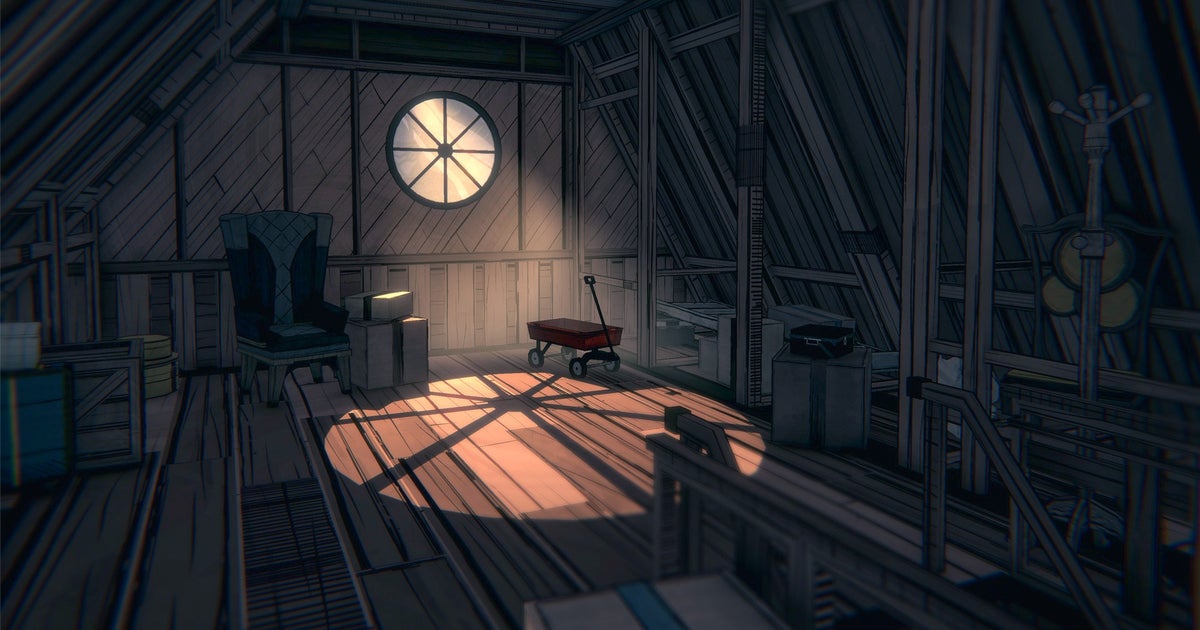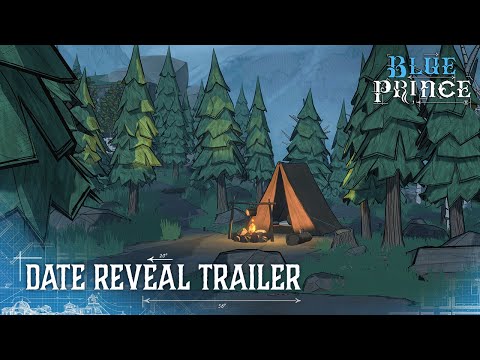One of the things video games do really well is absence – specifically recent absence. Dump me into a game world and give me enough clues that someone else has just left and I’ll be happy for hours. A cigar still sending up a ribbon of smoke from an overflowing ashtray, the wind plucking at a curtain where a window has been left just slightly open, a microwave that has some kind of horrible lasagne in it that’s still – jeepers – giving off a hint of steam? Games are brilliant at this kind of Marie Celeste set-up. Instant mystery. I don’t need actual people around. I just want to know who, what, why?
These are all questions that Blue Prince finds time for, in its way, but its most pressing issue is where? An eccentric relative – the best kind of relative – has left you a sprawling house – the best kind of house, now I think about it. There’s a catch, though. The house contains 45 rooms, but if you can find the secret 46th, you get to keep the whole place. And there’s a further catch. More of a wrinkle, actually. These rooms move around every night. So every morning you head into the main entrance lobby where three closed doors await. Open a door and you draft three potential rooms that might lie behind it. Pick one and you’re off on your adventure. You build the house by choosing which room is found behind each room.
There’s more to it than this, of course, but this is in itself a considerable piece of video game magic, and one worth hovering around for a while. This is because it’s seamless. That’s the thing I love about it. You pick the room, open the door, and magically the room you picked is instantly waiting for you behind that door. Even better, when you get a corridor going, you can look through a suite of rooms and see all your choices laid out and connected behind you, and like a deck of cards that’s been honestly shuffled, you might ponder the fact that these rooms may never fit together in quite the same way ever again.
The game stuff: Blue Prince comes at players in waves. At first, I was just trying to get as many rooms on the board during each day. I needed to get to 46? Fine: I’ll get to 46. At this stage, Blue Prince reminded me, in its own, architectural way, of something we were all concerned with during lockdown itself. Remember R? Apologies if this is causing flashbacks. R was the number of other people that an infected person would pass Covid onto while they had it. The lower R was, the fewer people would be infected, so R was a way of telling – I think – whether Covid was expanding or contracting. With Blue Prince you’re thinking about R in reverse, and you’re thinking about R in terms of doors. When I add a room, does it increase the number of doors in the building? The higher the number of doors, the more likely you’ll be able to keep the floor plan building towards 45, or 46 rooms. The fewer the number of doors – cul-de-sacs, rooms with doors that won’t work because they won’t line up with existing doors you’ve already placed, the sooner you’ll find yourself with nowhere to go. It’s architectural epidemiology.
Hmmm. Thinking about Blue Prince in this way is natural at first, I suspect, but over time I started to realise that doors were just one of a series of resources the game encourages you to juggle as you work. Besides the doors themselves, the simplest of these resources is footsteps. You have a set number of footsteps at the start of each day and you lose one whenever you move from one room into another. This means you lose them steadily as you build, but also that you lose them in big gulps if you have to backtrack – when you reach a dead end for example. Some rooms have special bonuses that grant more footsteps and some rooms have special conditions that take additional footsteps away. Run out of footsteps and you’re done for the day. You retire for the night and then the lobby with its three doors and its fresh decisions awaits the next morning.



Alongside doors you have to consider coins, gems and keys. Coins are collected as you go – maybe you find them on a mantle or sat at the edge of a bar, and they can allow you, in certain rooms, to buy special items. Some rooms – like the chapel – take away coins as you pass. Other rooms – I’m specifically thinking of the pantry – will always have a stack of coins waiting for you. Gems and keys, meanwhile, are all about opening doors. Some doors are locked, so you’ll need a key – a standard key, perhaps, or a special key that will grant a particular kind of room choice beyond it. Or a key to a specific location – and that stuff is probably best left to you to find out by yourself. Gems, on the other hand, allow you to buy certain room options which come at an extra gem cost. Often these are the really good rooms. Anyone can have a den, say, but who can afford an observatory?
(Coins, gems and keys also encourage you to look at the environments, incidentally, and how beautifully – and perhaps playfully – they’re put together. A fancy corridor might have a dandy top hat resting on a sofa, while keys might be neatly hung by the door in the garage. The room with the dartboard also has a nice little bar with drinks and glasses stocked. My favourite room of all is in the process of being painted, and has a packing tape gun laid on a crate for later use. Recent absence indeed.)
The reason you’re picking between different rooms, incidentally, is not just for the doors they have or the way they work for your layout, but because of the bonuses they’ll confer in terms of the other resources. But this is all just at the start. Blue Prince’s waves continue. And some of the later waves should really not be spoiled. Suffice to say: maybe there’s more to the house than the rooms inside it. And, crucially, maybe there’s more to specific rooms than first becomes apparent.


To put it another way, some rooms are puzzles in and of themselves, and some puzzles require multiple rooms in order to solve them and progress. At its simplest, maybe one room – I think it’s a bedroom – has a safe with a keypad. Can you find the code for the keypad? Getting more complex, in another room you might find a computer that allows you to alter a certain kind of lock mechanism in the house, that might in turn allow you to access a door that… I should say no more. Another room might contain a boiler with a series of pipes and valves to manipulate. Another room might be entirely dark – does a different room offer you the chance to get the lights back on?
It’s through these puzzles, and through the rooms’ interactions with a series of items you can randomly pick up as you move through the house, which start you thinking about narrative – and Blue Prince is ultimately a game that’s all about its narrative. Who lived here? What happened to them? Why? All of this spills out of that first question, where? In game terms it’s delightful stuff because of the run-based nature of Blue Prince. On one run I might have the perfect item to unlock something in a room that’s been bugging me, but will I get the room in drafts? In another I might get a chance to permanently upgrade a room for the future, but I need to pick through a bunch of different rooms that all have their own specific claims for that upgrade. This is, inevitably, just the start of the things this game has in store for you.


And that’s the crux of this really. What I love most about Blue Prince is this sense of a place and an idea and an understanding that evolves over time. Yes, I start to think more cannily about conserving footsteps and minimising backtracking, but I also start to sense buried harmonies within rooms and within a room’s position in the available house grid. Which kind of room should really always be at the outside of the grid? When is it a waste to use one of the really good corridors? How many available doors must be in play for me to gamble on a cul-de-sac card like the breaker room? What’s really going on inside the rooms themselves?


More than anything, Blue Prince seems aware of the time you’re spending within it, and that’s pure magic to me. The richest aspect of the game’s extremely rich design may be how many secrets it springs once you’ve lived with it for a while. It’s the pleasure of finding hidden aspects to things you thought you understood in full, the pleasure of coming back to something you thought was simple and finding that it’s not simple at all.
This is the magic of spaces and architecture, if you ask me. Blue Prince bottles this, but every good building, even if it doesn’t have the ability to reconfigure itself around you every morning, will change a little as you change and as your relationship to it changes.
Last week, after playing a massive Blue Prince session in which I got no closer to Room 46, I started to think about the school I went to back in the day. The school had 26 classrooms, and I know this – and can still remember it – because new kids were forever being sent to pick something up from Room 27. I fell for this more than once. We all did, but I think I was particularly susceptible to it. Partly, granted, because I never really listened or paid attention, but partly because I wanted there to be a Room 27. I wanted more strange possibilities from the spaces I lived around. With Blue Prince I get that. What an extraordinary game this is.
Blue Prince code was provided by the publisher.

